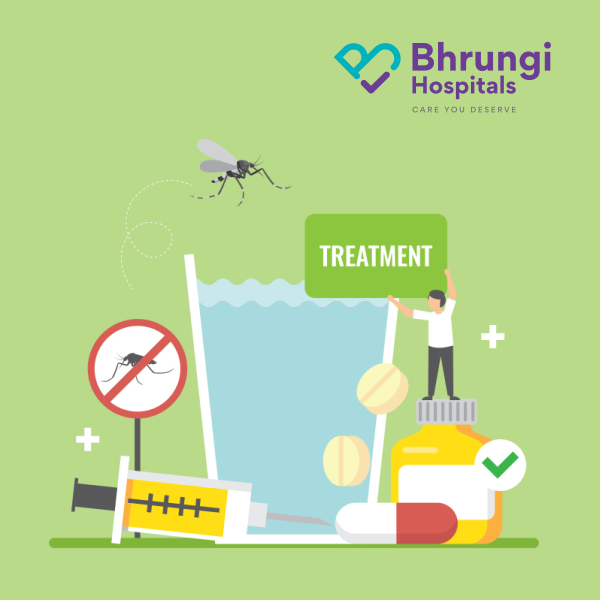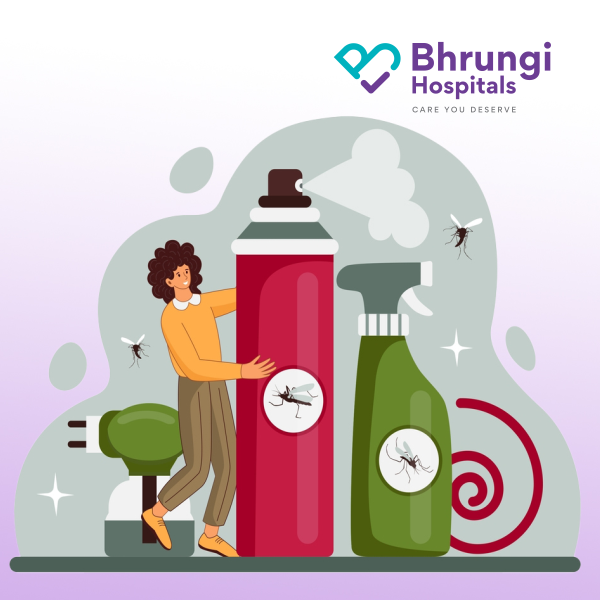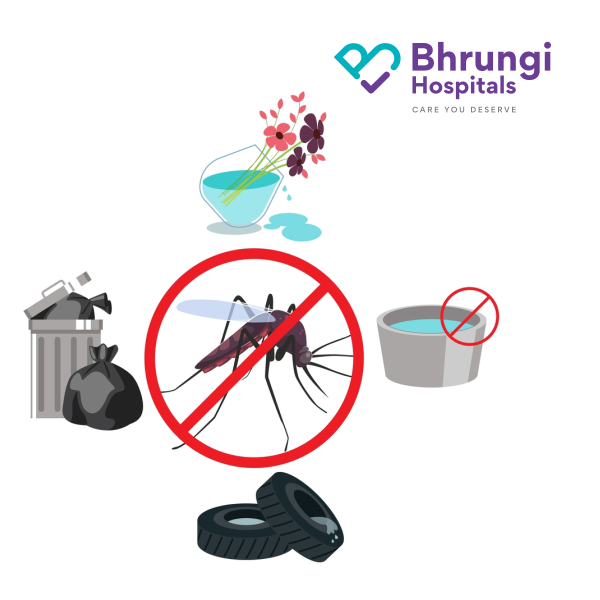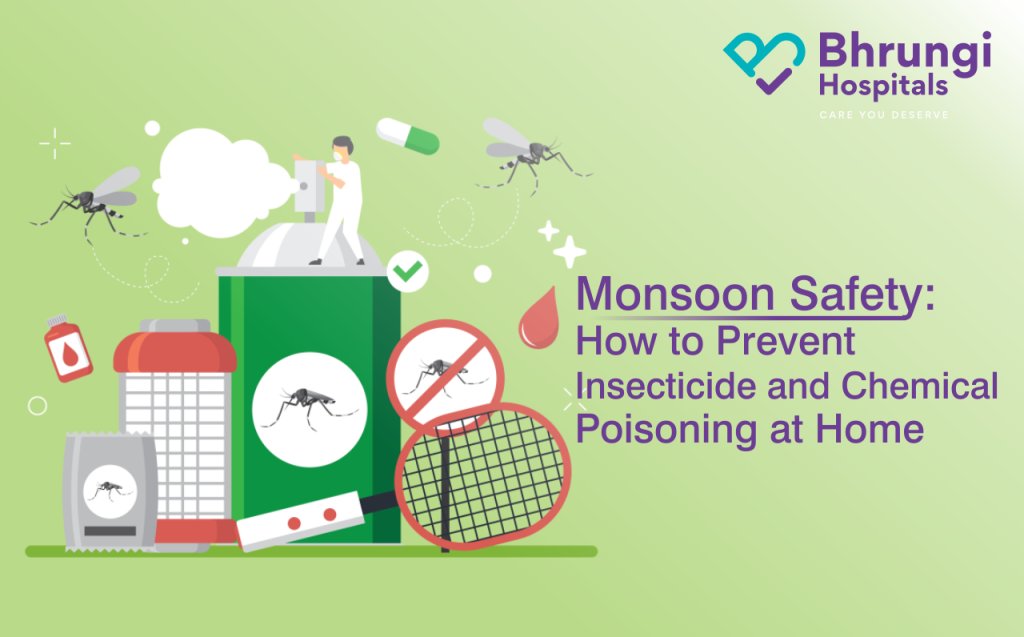The monsoon, with its refreshing showers and lush greenery, brings a much-needed respite from the scorching heat. Yet, as the humidity rises and stagnant water bodies form, so does the prevalence of unwelcome guests: insects. Increased humidity and waterlogging create ideal breeding grounds for insects like mosquitoes, cockroaches, and flies, prompting many households to reach for insecticides and chemical sprays. While these products are essential for maintaining hygiene and controlling pests, their improper storage and misuse can inadvertently lead to dangerous chemical and insecticide poisoning at home.

Understanding the Risks
Insecticides and household chemicals are effective in controlling pests, but they contain substances that can be harmful if inhaled, ingested, or absorbed through the skin. Symptoms of poisoning can range from mild irritation to severe reactions requiring immediate medical attention.

So, how can we enjoy the monsoon’s beauty without compromising our safety? Here are four key strategies to prevent insecticide and chemical poisoning at home:
Safe Storage and Handling
- Lock Up Chemicals: Always store insecticides, cleaning agents, pesticides, and other household chemicals in locked cabinets or high shelves, out of reach of children and pets. Never keep them in food or drink containers, as this increases the risk of accidental ingestion. Immediately close and secure all chemical containers after use. Don’t leave them unattended even for a short period.
- Original Containers: Use only the original containers for storage. Labels provide important safety information and instructions about the product, its ingredients, and first-aid in case of an emergency. Never transfer chemicals into unmarked bottles, especially food or beverage containers. This is a leading cause of accidental ingestion.
- Avoid Sunlight and Rain: Humidity can degrade chemicals over time, sometimes making them more volatile. Keep chemicals away from direct sunlight and rainwater, as exposure can degrade the product and increase the risk of leaks or spills. Store them in a cool, dry, well-ventilated area, away from direct sunlight and heat sources.

Application Safety
- Read the Label: Before using any insecticide or chemical product, read the label thoroughly and understand the instructions, warnings, and precautions. Follow all instructions, including dosage, dilution ratios, application methods, and safety precautions.
- Ventilation: Ensure proper ventilation when using sprays, aerosols, or strong cleaning agents, indoors. Open windows and doors or use exhaust fans to allow fresh air to circulate and reduce the risk of inhaling fumes.
- Protective Clothing: Wear protective clothing such as gloves, long-sleeved shirts, long pants, and closed shoes, and even eye protection to prevent inhalation or skin contact.
- Cover Food and Utensils: Before applying chemicals indoors, cover or remove all food, utensils, and dishes to prevent contamination.

Preventing Accidental poisoning
- Emergency Preparedness: Keep the number of your local poison control center handy. In India, you can contact the National Poison Information Centre for immediate assistance. For more details, please visit https://www.npis.org/
- First Aid: If poisoning is suspected, provide first aid as instructed on the product label and seek medical attention immediately.
- Disposal: Dispose of leftover pesticides and empty containers according to local regulations or community hazardous waste programs.
- Wash Hands Thoroughly: After handling any chemical or insecticide, wash your hands meticulously with soap and water

Hygiene and Prevention
- Wash Hands: Always wash your hands thoroughly with soap and water after handling chemicals, even if you wore gloves.
- Keep Surfaces Clean: Regularly clean kitchen surfaces, utensils, and floors to prevent cross-contamination and reduce the need for chemical use.
- Integrated Pest Management: While chemical products are useful, consider non-chemical methods to control pests, such as sealing cracks, removing standing water, and maintaining cleanliness to eliminate breeding sites. Explore natural alternatives for common monsoon pests. Citronella candles, essential oils, and even certain plants can help repel mosquitoes.
- Clean Thoroughly: Use deep cleaning techniques in kitchens and bathrooms to prevent pest infestations, reducing reliance on chemical sprays. For everyday cleaning, consider using vinegar, baking soda, and lemon juice. These natural alternatives are effective and significantly reduce chemical exposure.

Conclusion
The monsoon season can be enjoyed safely by taking a proactive approach to chemical and insecticide use. By implementing these preventative measures, we can protect our homes and loved ones from the hidden dangers lurking in our cleaning cabinets and pest control arsenal, ensuring a healthy and happy rainy season for everyone.

Bhrungi Hospital- Providing you Comprehensive and Coordinated Care That You Deserve
With a focus on holistic recovery, Bhrungi Hospital stands as a leader in high-quality emergency and critical care services in a patient-centered setting. Our integrated approach combines expertise, advanced technology, and compassionate care, focusing on safety and transparency while remaining affordable and accessible to all patients in need.
- ACLS Ambulance with free service within 10KMs radius
- Ventilator Ambulance service available
- Call +91 7845 108 108 anytime, any day
- 100+Beds Multispecialty Hospital
- 24×7 Emergency Care






